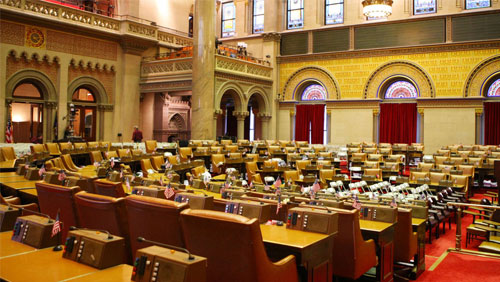New Yorkers aren’t typically known as pushovers, but it seems like they may have dropped the ball this time. As reported by Reuters, gaming officials are considering caving to demands of sports leagues as they prepare to draft legislation for the state’s sports betting laws. Many sports leagues have repeatedly claimed that they are entitled to a percentage of all sports bets, a fee  they have called an “integrity fee.”
they have called an “integrity fee.”
Peter Moschetti, a gaming commissioner for New York, said recently at a panel discussion being held during a gaming industry conference in Saratoga Springs, NY that “all” aspects of a NY Senate bill submitted earlier this year are being considered. This would apparently include the sports leagues’ integrity fee.
The fee has already been shot down by a number of states that have recently implemented sports gambling legislation. If NY moves forward and agrees to the demand, it will become the first state in the US to pay the fee.
The chairman of the NY Senate’s gaming committee, John Bonacic, introduced a sports gambling bill this past March. He is hoping that it will become the framework sued by state regulators in the state and, possibly, elsewhere. The bill would provide for a 8.5% state tax on sports betting revenue and an additional 0.20% fee paid by the casino operators to the major sports leagues.
The legislator asserts that the sports gambling market in NY could rival that of Nevada. He estimates that around $500 million would be spent on sports betting annually, almost twice as much as what is seen in Nevada. If he’s correct, it would produce around $41 million in revenue for the state.
Bonacic’s plan is “reasonable” according to Columbia University professor of global gaming law Laila Mintas. Mintas, who is also the deputy president of Sportsradar Group, also said that the integrity fee was a fair amount. It should be pointed out that Sportsradar Group sells the rights to data for sports leagues that is used to help sportsbooks create gambling odds.
Casino operators such as Seth Young, the executive director of online gaming at Connecticut’s Foxwoods Resort, disagrees and doesn’t believe that any integrity fee is necessary. He said that casino operators only have about a 5% margin on sports wagers and that the fee would drastically cut into the revenue stream.
Young, who attended the gaming industry conference, feels that “integrity” of sports gambling should be monitored by regulators, not the leagues. He added that sports betting will be intrinsically valuable to the leagues, as the casinos will spend more promoting games.
The senior VIP of the NBA, Dan Spillane, is pushing for a 0.25% integrity fee, along with the PGA and MLB. They are willing to compromise from the original 1% that was initially requested. Spillane indicated that, based on the numbers, the NBA could pick up around $7 million more annually from NY alone if the fee is given.
Seeing as the league’s teams generated $7.4 billion in revenue in the most recent year – a 25% increase from the previous year – it doesn’t appear that the league is hurting for money. A newly signed media rights deal, which took effect in 2016, saw ESPN and Turner Sports pay the NBA $24 billion, $2.6 billion annually. This was an increase of 180% over the previous media agreement, which was signed in 2007.